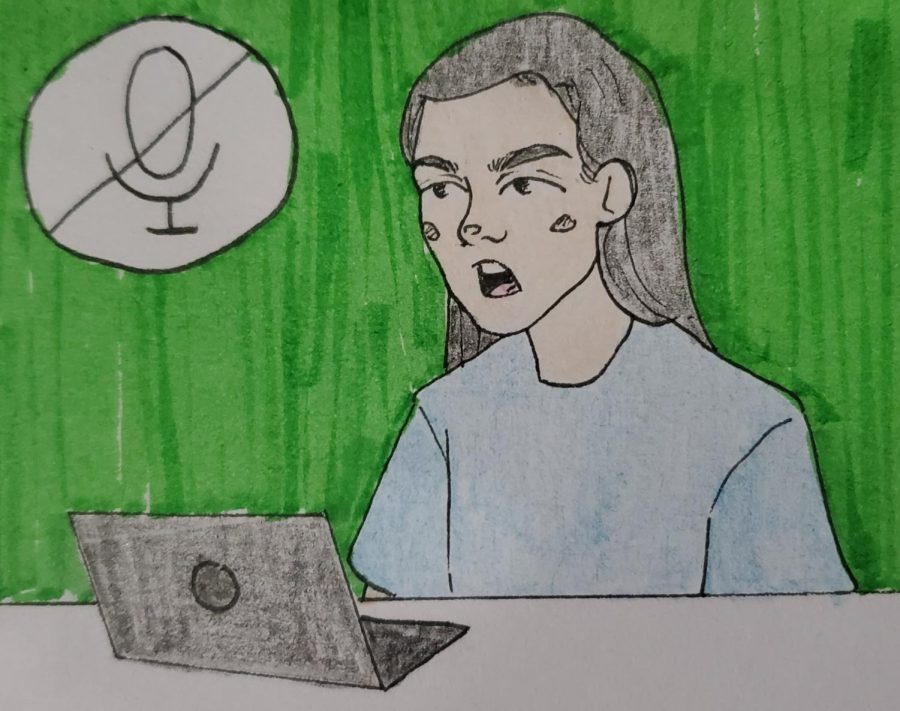Music department finds new ways to practice
October 28, 2020
Rather than playing along in the classroom, singing or playing an instrument with classmates, the music department has moved online during the pandemic. To create music while working through a computer screen is much different than the normal.
“I think it’s going to take some more time to determine if it’s better or worse because it is nice being able to sing and not worry about other people hearing you,” Gerald Slothower, senior, said. “When you’re with your choir, if something sounds off or a part is weird, we can fix that right away, and we have Rancatore to be very conscious about what we’re doing right and what we’re doing wrong. Without it, there is a disconnect between us, the singers, and Mr. Rancatore.”
While normally the choir would all sing together, the students now mute themselves while practicing to avoid any audio issues.
“Mr. Rancatore will play the piano and we will all be in the zoom call singing along with our mics muted, so we’re singing in our own personal bubble to ourselves,” Slothower said.
While the choir stays together and muted, the band has different instrument groups break away and practice.
“The flutes will go into a breakout room and work on an assignment together. Then, one person will unmute at a time and play while everyone else will play along with them. So, I’m hearing one student play and giving them feedback,” Chris Vanderwall, band director, said.
While the music department’s approach with their practice changes, they try to take away the stress of music while online by having an activity every day of the week.
“We do different themed days every day of the week. Like we have meditation Monday, tunesmith Tuesday, write it out Wednesday, themed Thursday and feel good Friday, and I think that’s a fun way to talk to everyone and discuss how we’re feeling and learn new things,” Jordan McCully, senior, said.
Rather than jumping into songs and preparing for concerts as they would in person, the choirs haven’t been making definite plans for future activities.
“Rancatore has decided to focus less on songs and pieces and getting a repertoire ready because all of this is so chaotic, and we don’t know what’s going to happen two weeks from now, so he’s taking it day by day,” Slothower said.
When a choir does take on a song, there have to be slight changes to the approach while online.
“When we get to the song that we’re learning, we open it up on Kami so we can make annotations and learn our part, and then we do the solfege, and then we sing with that while we’re all muted,” McCully said.
There are many resources online for the band and choir to take hold of to allow students to improve how they perform.
“We use a piece of software that is cloud-based called Smart music, that actually allows students to see the music on the screen, it’ll count the students off and they’ll play and it will give them feedback on the screen,” Vanderwall said. “We also use a website, musictheory.net, it’s a way to teach students music theory and how to construct major scales or minor scales or intervals.”
There are still many unknowns to working with music over the computer, so the choirs are taking time in adjusting to the situation and making the best of the available technology.
“What we’ve seen so far are a lot of these virtual performances, but it can’t happen over Zoom, so what we’re looking at is all of these programs and different software to capture audio and video. There is no perfect formula to do it;” Nathan Rancatore, choir director, said. “So, when it comes down to practicing, it’s using these programs so students get used to them so this way, we can put together these performances.”
While the music department is preparing to use technology to place together a piece of music, it becomes more apparent how long it would take to create a virtual performance.
“So far we’re just working on one song to get used to it; we’ve learned a little bit about the background of the piece and then we go over little bits every day. Eventually, we’re going to record ourselves singing it on a web browser called Soundtrap and then we record ourselves singing on Flipgrid. Mr. Rancatore will try to combine them together and create the song with all of us together,” McCully said.
While students of the music department enjoy being in-person more than online, being in a socially distant environment would have its challenges as well.
“Choir and band are probably some of the worst classes to be in amidst a pandemic because it’s around 32 or more people packed into the risers openly breathing and singing for an hour a day,” Slothower said.
As the music department is discovering new ways to hold class and their performances, they are also trying to find ways to improve online school for students.
“It’s not pen and paper anymore, it is trying to figure out what is maybe a better route or a more streamlined route for us teachers to better serve students as far as education goes. If you do things the old way, it just doesn’t work,” Rancatore said.




